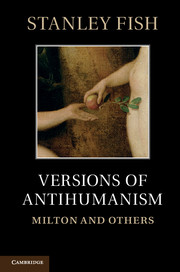Book contents
- Frontmatter
- Contents
- Acknowledgments
- Introduction: intention, historicism and interpretation
- Part I Milton
- Chapter 1 The Brenzel lectures
- Chapter 2 To the pure all things are pure
- Chapter 3 “There is nothing he cannot ask”
- Chapter 4 Why Milton matters; or, against historicism
- Chapter 5 Milton in popular culture
- Chapter 6 How the reviews work
- Chapter 7 The new Milton criticism
- Part II Early modern literature
- Index
Chapter 1 - The Brenzel lectures
Published online by Cambridge University Press: 05 May 2012
- Frontmatter
- Contents
- Acknowledgments
- Introduction: intention, historicism and interpretation
- Part I Milton
- Chapter 1 The Brenzel lectures
- Chapter 2 To the pure all things are pure
- Chapter 3 “There is nothing he cannot ask”
- Chapter 4 Why Milton matters; or, against historicism
- Chapter 5 Milton in popular culture
- Chapter 6 How the reviews work
- Chapter 7 The new Milton criticism
- Part II Early modern literature
- Index
Summary
INTRODUCTION
Why read Paradise Lost? For that matter, why read poetry at all? What pleasure and/or instruction does it give? Is what it offers unique, or can it be derived more easily and succinctly from other sources? These are all questions too large to be answered in a short series such as this one, but I hope to gesture toward an answer by introducing you to the demands and rewards of one piece of poetry generally acknowledged to be among the most impressive productions of the human mind. My thesis is that engagement of a particularly attentive kind with that poem will tell you more about it and about poetry in general than any abstract formulations I could provide.
Let's plunge right in with a single line taken from the first book of the poem at the moment when its hero or antihero (the choice will always be yours) summons up the host of rebel angels whom he has led to disastrous defeat. As their roll is called, Milton's epic voice observes that it is these shadowy figures who will later be worshipped by superstitious men and women under names like Belial and Moloch. He wonders at the perverseness and stupidity of such worship and expresses that wonder in a single contemptuous line: “And Devils to adore for Deities” (i, 373). The message is clear; for reasons the epic voice can barely fathom, multitudes of men and women will be unable to tell the difference between devils and deities, and will bow down to the former in despite of the latter. “How could they be so stupid?” the line implicitly asks, but at the same time, the formal features of the line provide the answers to its own implied question. For if the wonder is that people would mistake devils for deities, both the rhythms and the alliterative pattern of the line imitate and participate in that same mistake. Not only are devils and deities equivalent in syllables; they are equivalent also in the position of vowel sounds and in the joint possession of the initial consonant “D,” and moreover they are linked in the line by a mirroring structure of sound – “adore for” – which repeats and deepens the similarities that fill a line whose sense insists on difference.
- Type
- Chapter
- Information
- Versions of AntihumanismMilton and Others, pp. 23 - 64Publisher: Cambridge University PressPrint publication year: 2012



